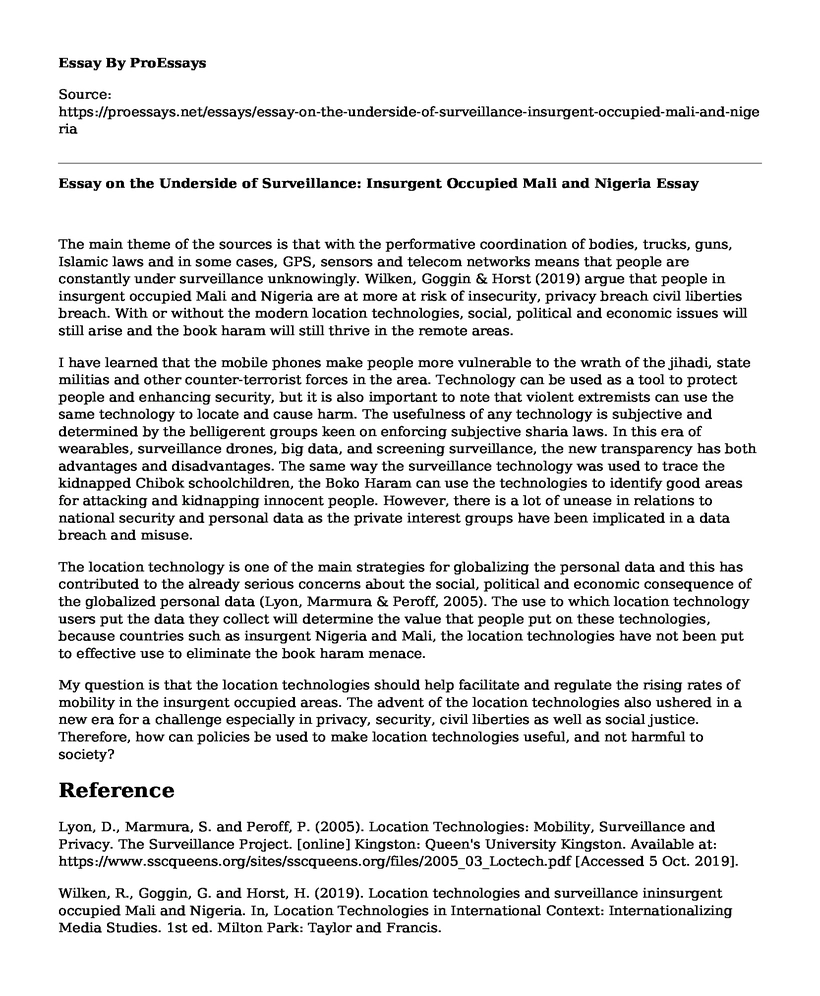The main theme of the sources is that with the performative coordination of bodies, trucks, guns, Islamic laws and in some cases, GPS, sensors and telecom networks means that people are constantly under surveillance unknowingly. Wilken, Goggin & Horst (2019) argue that people in insurgent occupied Mali and Nigeria are at more at risk of insecurity, privacy breach civil liberties breach. With or without the modern location technologies, social, political and economic issues will still arise and the book haram will still thrive in the remote areas.
I have learned that the mobile phones make people more vulnerable to the wrath of the jihadi, state militias and other counter-terrorist forces in the area. Technology can be used as a tool to protect people and enhancing security, but it is also important to note that violent extremists can use the same technology to locate and cause harm. The usefulness of any technology is subjective and determined by the belligerent groups keen on enforcing subjective sharia laws. In this era of wearables, surveillance drones, big data, and screening surveillance, the new transparency has both advantages and disadvantages. The same way the surveillance technology was used to trace the kidnapped Chibok schoolchildren, the Boko Haram can use the technologies to identify good areas for attacking and kidnapping innocent people. However, there is a lot of unease in relations to national security and personal data as the private interest groups have been implicated in a data breach and misuse.
The location technology is one of the main strategies for globalizing the personal data and this has contributed to the already serious concerns about the social, political and economic consequence of the globalized personal data (Lyon, Marmura & Peroff, 2005). The use to which location technology users put the data they collect will determine the value that people put on these technologies, because countries such as insurgent Nigeria and Mali, the location technologies have not been put to effective use to eliminate the book haram menace.
My question is that the location technologies should help facilitate and regulate the rising rates of mobility in the insurgent occupied areas. The advent of the location technologies also ushered in a new era for a challenge especially in privacy, security, civil liberties as well as social justice. Therefore, how can policies be used to make location technologies useful, and not harmful to society?
Reference
Lyon, D., Marmura, S. and Peroff, P. (2005). Location Technologies: Mobility, Surveillance and Privacy. The Surveillance Project. [online] Kingston: Queen's University Kingston. Available at: https://www.sscqueens.org/sites/sscqueens.org/files/2005_03_Loctech.pdf [Accessed 5 Oct. 2019].
Wilken, R., Goggin, G. and Horst, H. (2019). Location technologies and surveillance ininsurgent occupied Mali and Nigeria. In, Location Technologies in International Context: Internationalizing Media Studies. 1st ed. Milton Park: Taylor and Francis.
Cite this page
Essay on the Underside of Surveillance: Insurgent Occupied Mali and Nigeria. (2023, Feb 21). Retrieved from https://proessays.net/essays/essay-on-the-underside-of-surveillance-insurgent-occupied-mali-and-nigeria
If you are the original author of this essay and no longer wish to have it published on the ProEssays website, please click below to request its removal:
- Indiana State Politics and Policymaking Research Example
- The Correlation Between Urban Growth in Term of Population and Obesity in the United States
- Rhetorical Analysis of President Barack Obama's Second Inaugural Address
- Making Public Policy in Healthcare Essay Example
- Reforms Impacting Public Sector Unions: Effects on Employees, Employers & Taxpayers - Essay Sample
- Essay Sample on Peru's Tough Decision: Conserve or Export Natural Gas?
- Essay Sample on Antebellum Era: Slavery, Abolitionists & Manufacturing Revolution







